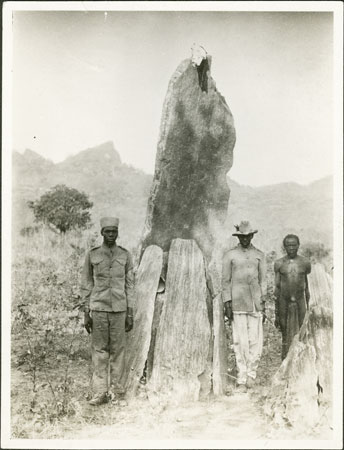Moro Meza grave

103 x 75 mm | Print gelatin silver
Condition:
Sulphide staining [EE 1989]
Date of Print:
Unknown
Previous PRM Number:
EP.M.6
Previous Other Number:
IV 9
Accession Number:
1998.345.6
Description:
Three men (unidentified, two wearing colonial military-style clothing), standing beside the approximately ten foot tall grave of Chief Beliyiye, father of Chief Yilu, at Lui.
This tall 'pyramid' type megalithic grave once stood in the centre of the chief's homestead but is now in the bush, the homestead having moved.
One larger slab is placed as a pointer, pointing towards the east.
A man's large grave stone pointed east towards the hunter's rising sun.
Such megalithic grave markers were peculiar to the Moro Meza, and was not generally found among other so-called Moro groups neighbouring.
A smaller but similar grave marker seen to the right is probably that of a child.
Photographer:
Edward Evan Evans-Pritchard
Date of Photo:
1927
Region:
[Southern Sudan] Western Equatoria Amadi District Lui
Group:
Moro Meza
NamedPerson:
Chief Beliyiye
Publication History:
Contemporary Publication - Reproduced as Fig 3 (Plate II) (facing page 152) in E.
E.
Evans-Pritchard's article '
Megalithic Grave-Monuments in the Anglo-Egyptian Sudan and other parts of East Africa'
,
Antiquity
, IX, No.34, 1935, with the caption "Moro Mise pyramid grave monument".
[Chris Morton 1/3/2004]
PRM Source:
Edward Evan Evans-Pritchard
Acquired:
Donated 1966
Other Owners:
E. E. Evans-Pritchard Collection
Class:
Death , Clothing , Colonial
Keyword:
Grave , Grave Marker , Megalith , Uniform
Documentation:
Original catalogue lists in Manuscript Collections. Additional material in related documents files. [CM 27/9/2005]
Primary Documentation:
PRM Accession Records - Accession Book Entry [p.
98] 1966.27 [1 - 24] G[ift] PROFESSOR E.
E.
EVANS-PRITCHARD; INST.
OF SOCIAL ANTHROPOLOGY, 51 BANBURY RD.
OXFORD - 1966.27.19 - S.
SUDAN, DARFUNG.
VARIOUS TRIBES.
Box of negatives in envelopes, [1 - 242] & 1966.27.20 - Box of prints of these negatives [refers to object 1966.27.19] [1 - 242], in envelopes.
Note on print reverse ms pencil - "Stone grave construction [other indecipherable faint words]"
ms blue pencil - "not used in article CGS"
ms pencil - "E.E. Evans-Pritchard, Mon Abri, Crowborough, 10/6"
Notes on card mount ms pencil - "SS overall 8.89"
Note on print reverse ms pencil - "Stone grave construction [other indecipherable faint words]"
ms blue pencil - "not used in article CGS"
ms pencil - "E.E. Evans-Pritchard, Mon Abri, Crowborough, 10/6"
Notes on card mount ms pencil - "SS overall 8.89"
Other Information:
Ethnographic context - In 'Megalithic Grave-Monuments in the Anglo-Egyptian Sudan and other parts of East Africa', Antiquity, IX, No.34 1935, page 155-156, E.
E.
Evans-Pritchard notes that '[t]he pyramids are generally taller than a man and some must be over ten feet in height.
The longest stone pointer I have seen is shown in Fig.3.
It marks the grave of Beliyiye, father of Chief Yilu at Lui.' [Chris Morton 1/3/2004] On page 156 he further notes that '[t]he structure of the pyramid type of grave in Mise country ...
consist[s] of slabs of flat white granite leaning together in pairs one above another with one slab much taller than the rest pointing either to the rising or the setting sun.
If the grave contains a man the stone pointer leans to the east, whereas if it houses a woman it points to the west; because when a man rises from sleep he shades his eyes and looks to the rising sun which marks the beginning of a hunter's day; whereas when a woman wakes from sleep in the afternoon, she shades her eyes to the west, for when the sun goes down in the west she prepares the evening meal...Among the Mise one observes many small pyramids about two feet high built in the same manner as the larger pyramids but on a smaller scale.
These mark the graves of children...
All graves are dug within the homestead enclosure.' [Chris Morton 26/2/2004]
Recorder:
Christopher Morton 1/3/2004 [Southern Sudan Project]

